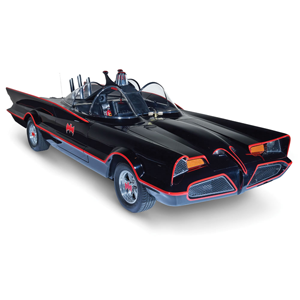 The United States Court of Appeals for the Ninth Circuit affirmed the District Court for the Central District of California’s decision that the Batmobile is entitled to copyright protection.
The United States Court of Appeals for the Ninth Circuit affirmed the District Court for the Central District of California’s decision that the Batmobile is entitled to copyright protection.
In May 2011, DC Comics, the publisher and copyright owner of the Batman comic books, brought an action against Mark Towle, a mechanic who produced replicas of the 1966 and 1989 versions of the Batmobile, for copyright infringement. In order for DC Comics to prevail on its claim, it had to prove that it owned a copyright in the Batmobile as it appeared in the television show and the movie and that Towle created unauthorized replicas.
Towle countered DC Comics’s assertions by arguing that DC Comics did not own the copyrights for the 1966 and 1989 versions of the Batmobile. He further argued that even if DC Comics owned the copyrights, the Batmobile was not subject to copyright protection.
“Holy copyright Law, Batman!” as stated best by Judge Ikurta in her September 23 opinion, which ruled that the Batmobile is an “especially distinctive character entitled to copyright protection.” She further stated “Courts have recognized that copyright protection extends not only to an original work as a whole, but also to ‘sufficiently distinctive’ elements, like comic books characters, contained within the work.”
The court determined that the Batmobile is entitled to copyright protection by using a three part test that requires the character to have “physical as well as conceptual qualities,” it must be “sufficiently delineated,” and it must be “especially distinctive.” The Batmobile meets all the criteria of this test. First, the Batmobile has been drawn in comic books and appeared in television shows and movies. Second, the Batmobile has maintained its status as a “highly-interactive vehicle, equipped with high tech gadgets and weaponry used to aid Batman in fighting crime.” Third, the Batmobile has maintained its “distinct physical and conceptual qualities since its first appearance in the comic books in 1941.”
The court further stated that there was no dispute that DC Comics created Batmobile and although it has entered in various licenses over the years to produce derivative work, it did not transfer its underlying property rights of the character. The court stated that “if a third party copies a derivative work without authorization, it infringes the original copyright owner’s copyright in the underlying work to the extent the unauthorized copy of the derivative work also copies the underlying work.” Simply put, Towle infringed on DC Comics’s copyrights because he did not get authorization before producing the 1966 and 1989 replica Batmobiles.
The lesson learned from Towle’s mistake is to make sure you apply the court’s three part test before you produce any potential derivative work without authorization, otherwise it can deliver a POW! to your business.
